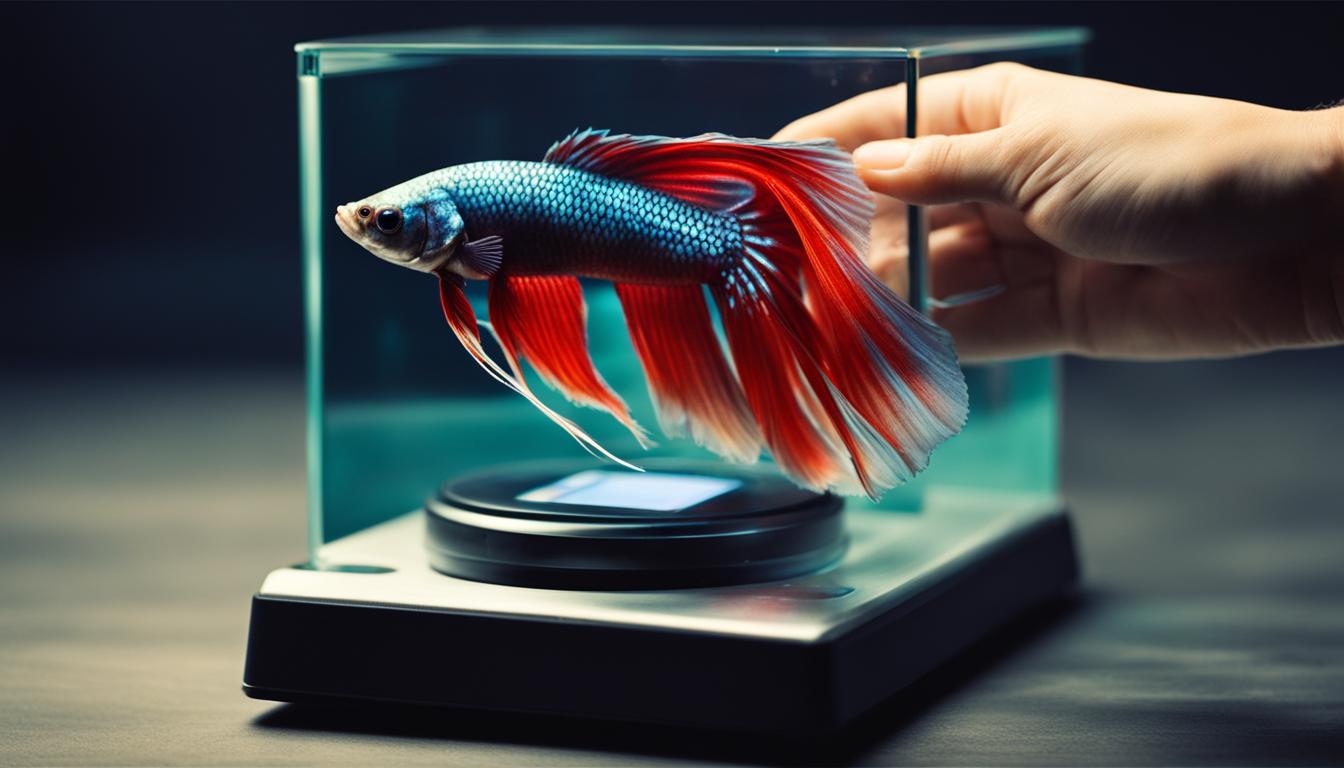Last Updated on 4 months by admin
Are you a betta fish owner looking to ensure the optimal care and well-being of your pet? One important aspect of betta fish care is weighing them accurately and regularly. By measuring their weight, you can determine if they are undernourished or overweight, helping you address any potential health issues.
In this section, we will introduce the importance of weighing betta fish and provide an overview of the weighing techniques that will help you accurately determine your pet’s weight.
There are several techniques available for measuring your betta fish’s weight, from using digital scales to makeshift balances. By following the right steps, you can master the art of weighing betta fish quickly and accurately.
Key Takeaways:
- Weighing betta fish is crucial for maintaining their overall health and well-being
- There are a variety of weighing techniques available for accurately measuring your betta fish’s weight
- By understanding ideal betta fish weight ranges, you can better assess their health based on fluctuations in weight
- Common mistakes, such as improper tools or handling, can harm your betta fish during the weighing process
- Accurately weighing your betta fish is just one aspect of providing proper care, so it’s important to also focus on factors such as their diet and tank conditions.
Why Weighing Betta Fish is Important for Their Care
As a responsible betta fish owner, you must know how essential it is to keep track of your pet’s weight. Regular weighing and monitoring of betta fish weight is a simple yet crucial aspect of pet care. It offers valuable insights into your pet’s overall health and well-being.
Importance of Weighing Betta Fish
Betta fish weight measurement is an essential tool for evaluating the health of your pet. Weighing your betta fish regularly can help detect any significant fluctuations in weight, indicating potential health issues. It can also indicate if your fish is undernourished or overweight, allowing you to make necessary adjustments to their diet and routine.
Monitoring the weight of your betta fish can also help you track the effectiveness of any changes you make to their diet or routine.
Betta Fish Weight Measurement
Betta fish weight measurement involves using a digital scale or a makeshift balance to weigh your fish. The weight can be measured in grams or ounces.
It is essential to weigh your pet correctly to ensure accurate results. Factors like the weight of the container, water, or décor items in the tank can affect the readings. Thus, it is crucial to follow the correct weighing technique to ensure precise measurements.
Why Weight Fluctuations Matter
Weight fluctuations can indicate potential health issues in your betta fish. A significant weight loss can indicate an underlying disease like parasitic infections or bacterial infections. On the other hand, rapid weight gain can be a sign of overfeeding or constipation.
Regular weighing can help you detect these issues early and get appropriate treatment promptly.
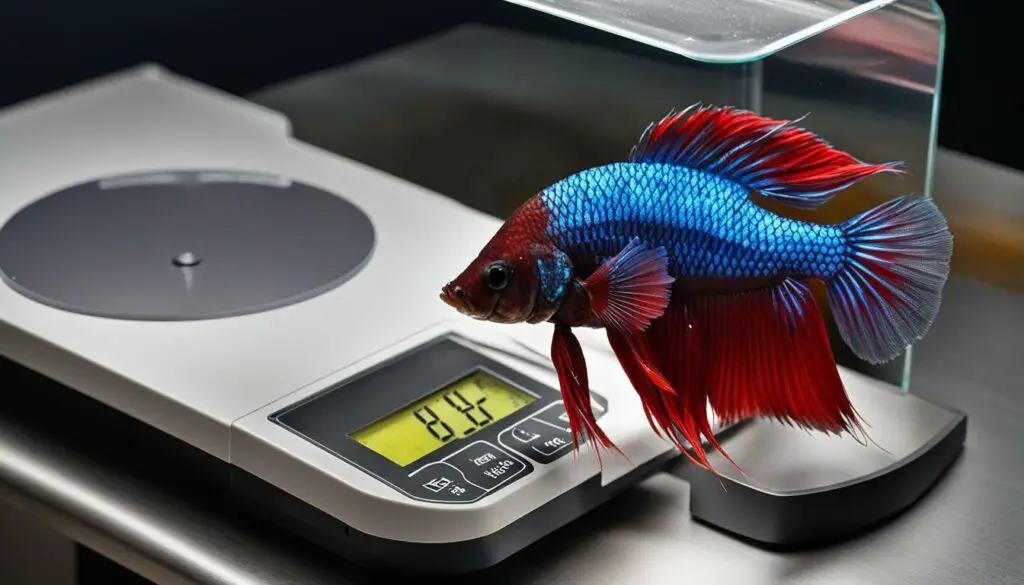
Keeping a record of your betta fish’s weight can also help you track their growth and development over time. It can help you plan your pet’s diet and adjust it according to their changing needs.
As you can see, weighing your betta fish is essential for their care and well-being. With the right tools and techniques, you can weigh your pet accurately and ensure their optimal health.
Tools Needed for Weighing Betta Fish
Before you begin weighing your betta fish, there are several tools you should have on hand to ensure accurate measurements and a stress-free experience for your pet. These tools include:
- Aquarium Container: Select a small, clear container that is large enough for your betta fish to comfortably move around in. A plastic cup or a clean plastic bag will suffice.
- Digital Scale: A digital kitchen scale is the most accurate option for weighing your betta fish. Make sure it has a tare function.
- Wet Paper Towel: Dampen a paper towel and place it at the bottom of the container. This will prevent your betta fish from slipping and reduce stress during the weighing process.
- Eye Dropper: Use an eye dropper to drip tank water into the container while your betta fish is inside to keep it hydrated and calm during the process.
Now that you have the necessary tools, it’s essential to follow best practices to ensure a smooth and safe weighing process for your betta fish. These include:
- Ensure the container you choose is clean and free of any chemicals or debris that could harm your pet.
- Be gentle when transferring your betta fish to the container to avoid causing stress or injury.
- Allow your betta fish to acclimate to the container for a few minutes before beginning the weighing process.
- Use the tare function on your digital scale to ensure an accurate measurement of your betta fish’s weight.
- Remove the damp paper towel from the bottom of the container after weighing to prevent any unwanted effect on the fish.
By following these best practices and using the proper tools, you can weigh your betta fish accurately and safely, ensuring optimal care for your beloved pet.
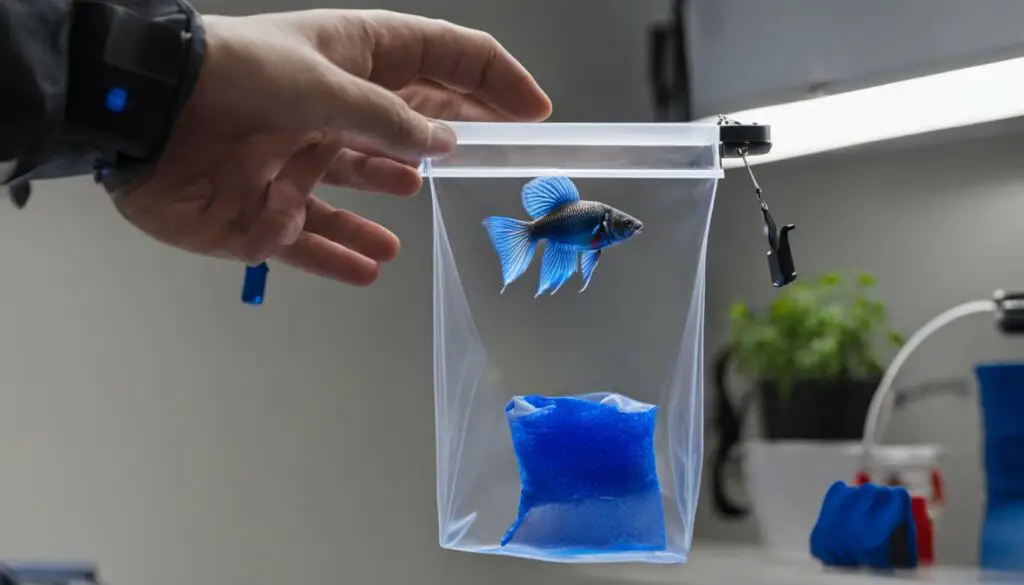
Step-by-Step Guide to Weighing Betta Fish
Accurately weighing your betta fish is crucial for their overall health and well-being. Here is a step-by-step guide to weigh your betta fish:
- Before beginning the weighing process, ensure that you have the necessary tools, such as a digital scale or a homemade balance. Refer to section 3 for more information on the tools required.
- Prepare a clean and dry container, such as a plastic cup or a small bowl, for your betta fish to sit in during the weighing process.
- If using a digital scale, turn it on and wait for it to zero out. If using a homemade balance, make sure it is level and balanced before proceeding.
- Place the container on the scale or the balance, and then tare or adjust the scale or balance to zero.
- Carefully place your betta fish into the container and make sure it is sitting still and upright.
- Record the weight on the scale or balance. If using a homemade balance, refer to the guide in section 3 for betta fish weight estimation or calculation.
- Remove the betta fish from the container and return it to its tank or temporary holding container.
- Sanitize all tools and containers used during the weighing process to prevent the spread of any potential diseases or infections.
It is important to note that weighing your betta fish too frequently can cause unnecessary stress. We recommend weighing your betta fish once a month to monitor its weight accurately.
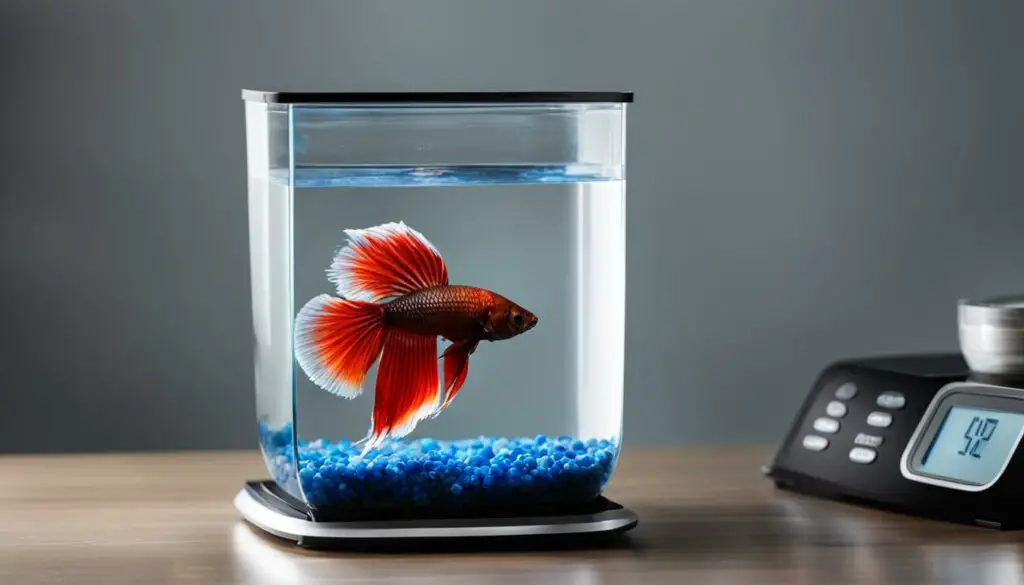
Understanding Ideal Betta Fish Weight
It’s essential to understand the ideal weight range for your betta fish based on their size and breed to maintain their overall health. A betta fish’s weight can be influenced by various factors such as age, sex, and activity level, but there are general guidelines to follow.
On average, an adult male betta fish can weigh between 0.1 and 0.3 ounces, while females can weigh between 0.2 and 0.5 ounces. However, the weight can vary depending on the breed and size of the fish.
| Betta Fish Breed | Typical Weight Range (in ounces) |
|---|---|
| Veiltail | 0.1 – 0.3 |
| Halfmoon | 0.2 – 0.4 |
| Crowntail | 0.1 – 0.3 |
| Doubletail | 0.1 – 0.3 |
It’s crucial to keep track of your betta’s weight to ensure that they are not undernourished or overweight. An undernourished betta fish can become lethargic and susceptible to diseases, while an overweight fish can experience health complications such as swim bladder disorder and shortened lifespan.
Pro-tip: We recommend weighing your betta fish every week to keep track of any weight fluctuations. This will help you identify any potential health concerns promptly.
Assessing Betta Fish Health Through Weight Changes
Weighing your betta fish regularly can help you identify potential health issues before they become serious. Fluctuations in weight can indicate changes in your pet’s health, so it is essential to monitor their weight consistently. In this section, we will discuss how to use weight changes to assess your betta fish’s overall health and well-being.
Recognizing Weight Fluctuations
It’s crucial to understand that betta fish’s weight can fluctuate depending on various factors, such as age, activity level, and diet. Therefore, you need to establish a baseline weight for your fish, so you have a point of reference to detect any changes accurately. Weight changes should be monitored over time and not just a one-off measurement.
If you notice that your betta fish’s weight is consistently increasing or decreasing outside the normal range, it may indicate a potential health issue that requires attention. It is essential to consult with a veterinarian who specializes in fish health if you have any concerns about your betta fish’s weight.
Possible Health Issues
Weight changes can be an early indicator of health issues in betta fish. For instance, sudden weight loss may suggest that your pet isn’t getting enough food or is suffering from an illness. On the other hand, rapid weight gain can be a sign of overfeeding or the development of a condition like dropsy, which is a bacterial infection characterized by swelling and bloating.
It’s vital to be proactive in identifying weight changes in your betta fish since prompt intervention can significantly improve their chances of recovery. Regular weighing can also help you track the effectiveness of treatment if your pet is undergoing therapy.
Stress-Free Weighing
Stress can cause betta fish to lose or gain weight, so it’s essential to ensure your pet is calm and relaxed during the weighing process. As discussed in section 3, you need to use an appropriate weighing method and tools to minimize stress during weighing. A calm environment, gentle handling, and patience can go a long way in reducing stress levels in your betta fish.
Furthermore, it’s best to avoid weighing your betta fish too frequently as it can cause undue stress and anxiety. Depending on your pet’s health status and treatment plan, your veterinarian may recommend a specific weighing frequency that you should follow.
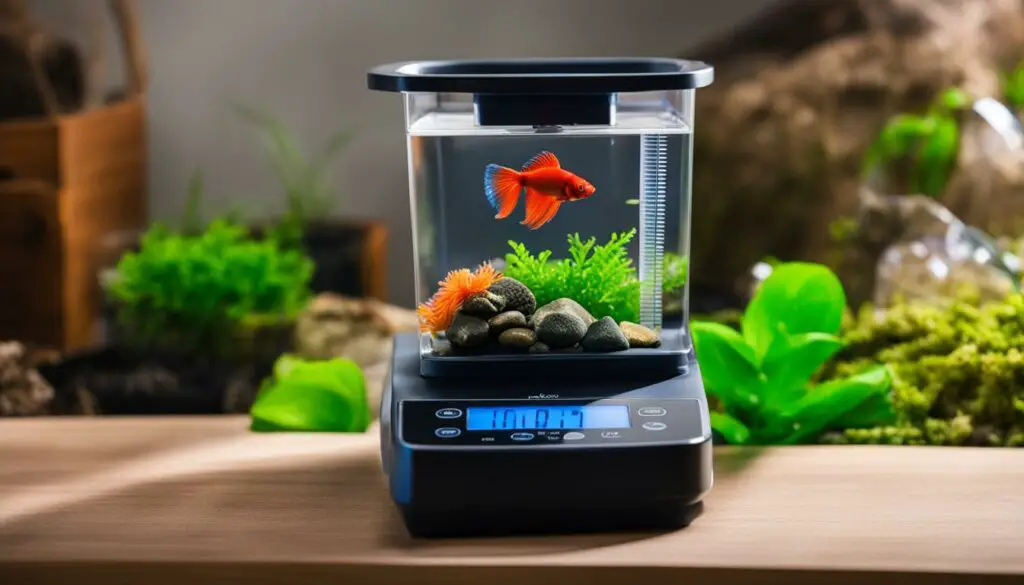
Conclusion
Regular weighing is a crucial part of betta fish care and can help you detect potential health issues early on. By monitoring weight changes, you can ensure that your pet is receiving the proper nutrition and care they need. Remember to establish a baseline weight, be mindful of possible health issues, and keep the weighing process stress-free to maintain optimal health and well-being for your betta fish.
Common Mistakes to Avoid When Weighing Betta Fish
Weighing your betta fish can be a delicate process, and there are many common mistakes that owners make when attempting to do so. Below are some important tips to ensure you weigh your betta fish accurately and without harming your pet:
- Not using the right tools: One of the most common mistakes is using incorrect or unsuitable tools for measuring your betta fish’s weight. Make sure to use a digital scale that can measure in decimal places, or a makeshift balance with a cup and ruler for smaller bettas. Avoid using kitchen or postal scales, as they may not provide accurate readings.
- Stressing out your fish: Weighing your betta fish can be a stressful experience for them, so it’s important to create a calm and comfortable environment during the process. Avoid handling your fish too much, and make sure the water temperature is consistent with their tank. Be patient and gentle when handling them, and don’t rush the process.
- Not zeroing the scale: Before weighing your fish, make sure to reset or “zero” your scale to account for the weight of the container or cup you will be using. This will provide a more accurate weight measurement for your betta fish.
- Overfeeding your fish: Overfeeding your betta fish can lead to weight gain and health issues, making it difficult to accurately measure their weight. Make sure to feed your fish an appropriate amount of food, and avoid overfeeding or using low-quality food that may not provide enough nutrients.
- Measuring your fish too often: Betta fish do not need to be weighed frequently, and doing so may cause stress and harm. Try to limit weight measurements to once a month or less, unless there are noticeable changes in your fish’s weight or health.
By avoiding these common mistakes, you can ensure that you accurately measure your betta fish’s weight and provide them with the proper care they need to thrive.
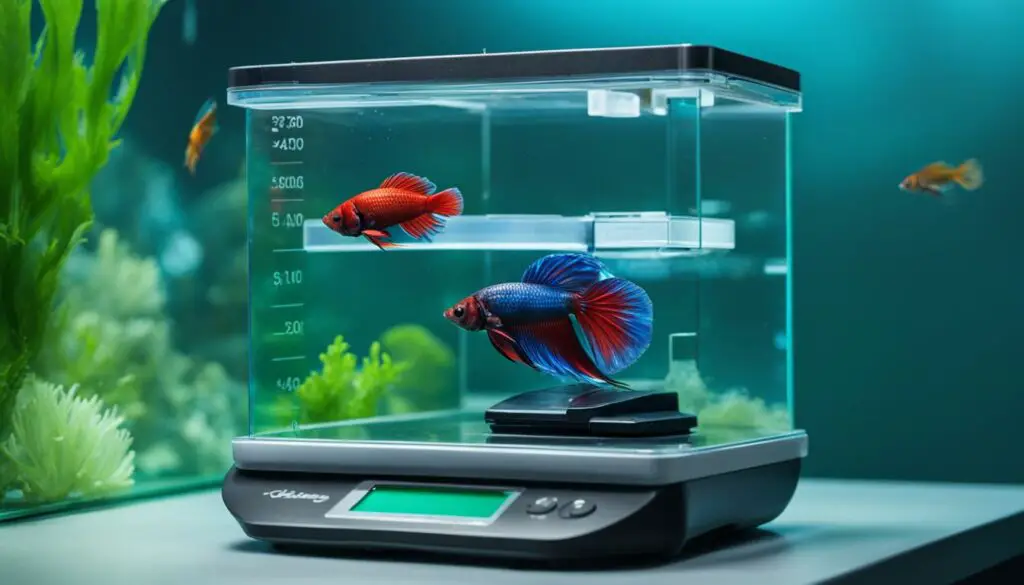
Additional Tips for Betta Fish Care
Aside from regular weighing, there are several other factors to consider when it comes to taking care of your betta fish. Here are a few additional tips:
- Diet: Betta fish are carnivorous, so their diet should consist of high-quality protein-rich foods. Flake and pellet foods are great options, but you can also provide live or frozen foods like brine shrimp or bloodworms as a treat.
- Tank conditions: Bettas need clean, warm water to thrive. Maintain a consistent water temperature of 78-80°F and change the water in their tank every week.
- Types of tanks: Bettas can live in a variety of tanks, including bowls, but they prefer tanks that are at least 2.5 gallons in size. Make sure the tank has a filter to remove any debris and keep the water clean.
- Behavior: Pay attention to your betta fish’s behavior. They are active fish and should be swimming around their tank regularly. If you notice any lethargy or unusual behavior, it may be a sign of an underlying health issue.
Remember, weighing your betta fish is just one aspect of their overall care. By providing a healthy diet, maintaining clean tank conditions, and monitoring their behavior, you can ensure that your betta fish is happy and healthy for years to come.
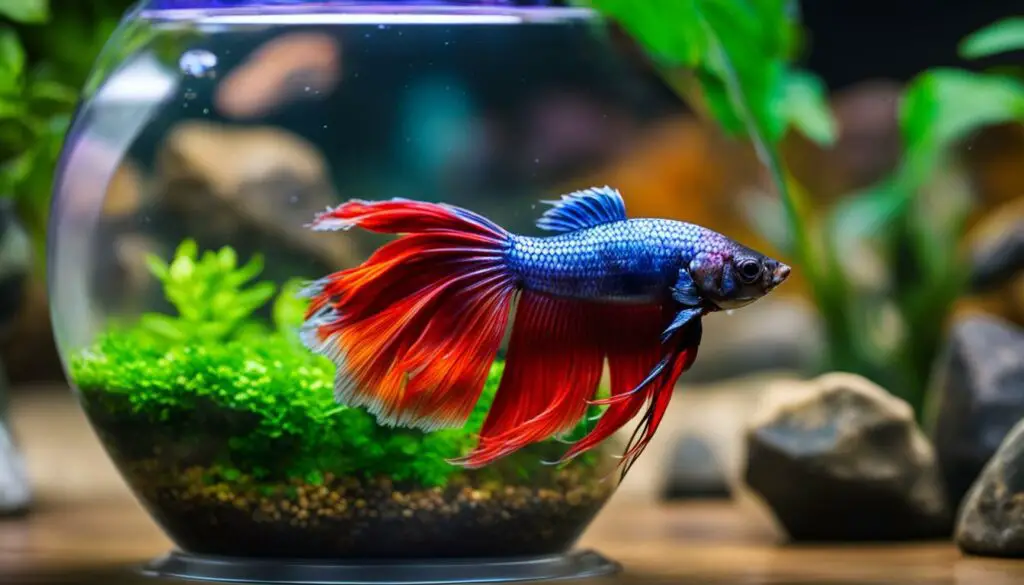
Conclusion
In conclusion, betta fish owners should prioritize weighing their pets regularly to ensure optimal health and well-being. By mastering betta fish weighing techniques and following best practices for weighing betta fish, owners can accurately determine their pet’s weight and track any weight changes that may indicate underlying health issues.
Taking Care of Your Betta Fish Beyond Weighing
Proper betta fish care extends beyond weight measurement. Maintaining a healthy diet, keeping the tank clean and well-maintained, and providing appropriate stimulation and exercise are all vital for a betta fish’s overall health and happiness.
By implementing these tips and techniques, you can foster a strong and healthy bond with your betta fish, ensuring they lead a happy and fulfilling life.
Remember, the key to successful betta fish ownership is proper care and attention. By prioritizing weighing and other aspects of betta fish care, you can provide your pet with the best possible life.
FAQ
Why is weighing betta fish important for their care?
Weighing betta fish is important because it can indicate if a fish is undernourished or overweight, helping address any potential health issues.
What tools are needed for weighing betta fish?
The essential tools for weighing betta fish accurately include a digital scale or makeshift balance to ensure accurate weight measurement.
Can you provide a step-by-step guide to weighing betta fish?
Yes, we have a detailed step-by-step guide on how to weigh betta fish using various methods, such as using a digital scale or a makeshift balance.
How can I determine the ideal weight for my betta fish?
The ideal weight for betta fish varies based on their size and breed. We will provide insights on factors that may affect a betta fish’s weight, such as age and activity level.
How can weight changes in betta fish indicate health issues?
Weight changes in betta fish can be indicative of potential health issues. We will help you understand the significance of weight fluctuations and how to use this information to provide appropriate care.
What are common mistakes to avoid when weighing betta fish?
Common mistakes to avoid when weighing betta fish include inaccuracies in weight measurement and potential harm to the fish. We will provide tips to ensure accurate weight measurement.
Are there any additional tips for betta fish care?
Yes, we will offer additional tips and insights on betta fish care beyond weighing, including important aspects such as diet, tank conditions, and general well-being.

